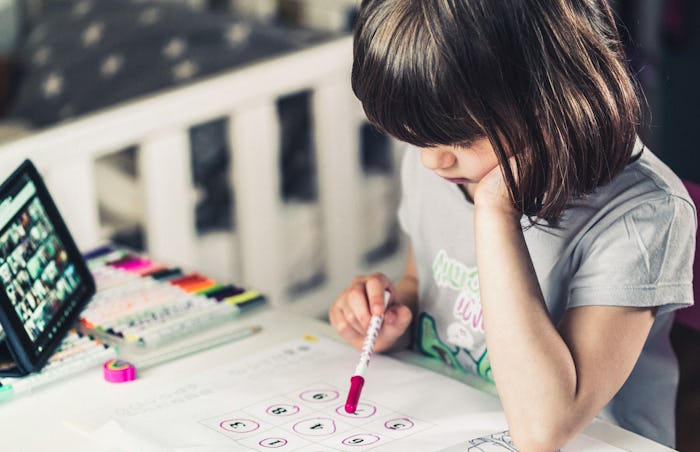Life

Teachers Weigh In On Those Viral FB Memes About Catching Kids Up In The Fall
Nothing like learning to work from home and becoming a teacher overnight — all during a global pandemic — to really send parents into a tailspin. In a now-viral Facebook post (the original source is unknown), schools and teachers across the country are urging parents not to panic, and that teachers will catch their students up when school resumes. So should parents really enforce learning time if their kids aren’t sticking with it? And what if they seem stressed out by all this change?
Martha Stewart, a middle school algebra and geometry teacher in Florida, tells Romper in an interview that she created a questionnaire for her students to check on their mental health. Her findings: they’re not stressed about coronavirus. They just miss school and their friends.
“Overall, my kids are fine. They’re bored and they’re sad because they want to be at school, but they’re not anxious about the crisis. A lot of my kids are grateful to have the schoolwork and say it’s nice to have something to do. They’re tired of watching Netflix and eating snacks, and the online meetings allow them to connect with their friends and talk to their teachers.”
Third-grade reading teacher Corrina Bosley says her students seem happy and healthy, too. She’s mostly trying to manage parents’ stress around schooling.
“Mine I’ve been talking to on the computer, they seem really excited to get back into it. They think this is fun and it’s a different way for them to learn. I’ve just been very actively reminding parents please do not stress, this is new for everyone, and reminding them why we’re doing it — everything we’re doing is better than nothing,” she says. “This is not the time to have a lot of expectations on them moving further with things we haven’t learned yet, but I think too that the stability of schedule and routine and having some schooling in place is helpful as far as their social-emotional well-being goes.”
So, if school is what they’re missing, maybe learning is exactly what they need to feel normal. Joanna DiPeppe, a national board-certified teacher of 24 years, teaches high school English in Florida. She tells Romper in an interview that learning and mental health aren’t opposites, as these posts might make it seem.
“If parents take their own interests, be they math, science, religion, literature, arts, or technology, and teach their kids something about them, they will be helping their kid’s mental health,” she says. “Parents who take an active role in their children’s learning — in creative, interactive, fun ways — will be helping their kids’ mental health by strengthening their family bond and building a sense of security.”
What most parents seem worried about, though, is whether their child will fall behind in school once life returns to normal. These viral Facebook posts reassure parents that teachers will pick up the slack on the backend, but is that really the case?
“People have been comparing it to the students who lived through Hurricane Katrina,” says Stewart. “It is going to affect their education as a whole, but not one kid over another unless their parents aren’t serving them at home.”
“My concern and my personal anxiety with that is what the expectations of us are going to be next year, because when the kids move on, we’re still going to be expected to teach that grade’s standards,” says Bosley. “Since they’re all going to be in the same spot, we can take the beginning of the year to do the previous year’s standards to get them caught up. I know that’s what I plan to do, but any little bit we’re doing with them now is better than not doing anything to keep them in that habit.”
DiPeppe seconds that, emphasizing how important it is for parents to help students maintain what they have learned and help them be successful in whatever schooling is available to them right now. “Should parents ‘scream’ at their children? No, absolutely not. But should parents relent simply because their kids are resistant toward learning from home? No, absolutely not. I would hope, rather, that parents would support learning in the best way that they can using resources made available to them by their children’s schools.”
What all of these educators agree on is that while your child’s mental health should come first, creating a school-like schedule will probably help put their minds at ease. Wayne Story, a kindergarten teacher of six years, says his students thrive on routine, as do pupils through high school.
“I think one of the biggest problems is the routine being disrupted, so what I’ve told parents is try to have a schedule. When the day starts, let them know what they’ll be doing today. 'First, we’re going to do math online on the computer. After that, we’ll have a break and read together,'” he says. “In school, it’s the same thing every day. Kids, especially kindergarteners, crave that routine and knowing what’s happening, and it sets them at ease.”
“They’re away from their teachers and friends, and that’s their whole life,” says Stewart. “The more you can do at home to bring that home, that’s the best thing you can do for them. That probably does mean a routine of some kind. Encouraging them to buy in and make the most of online lessons will help their mental health.”
Experts:
Martha Stewart, middle school algebra and geometry teacher in Florida
Corrina Bosley, third grade reaching teacher in Florida
Joanna DiPeppe, national board-certified teacher, teaching high school English in Florida
Wayne Story, kindergarten teacher in Florida
This article was originally published on